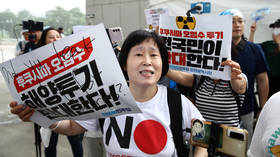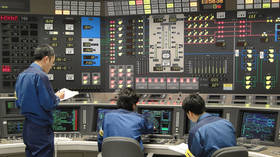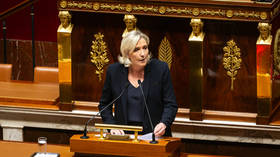UN nuclear watchdog chief met with protests in South Korea

Rafael Grossi, the director general of the International Atomic Energy Agency (IAEA), has got a frosty reception in South Korea. Local demonstrators have slammed the watchdog’s decision earlier this month to greenlight to Japan’s plans to release wastewater from the defunct Fukushima nuclear power plant into the Pacific Ocean.
On Sunday, Grossi held a meeting with lawmakers from South Korea’s main opposition party, the Democratic Party, at the National Assembly. Party leader Woo Won-shik accused the IAEA of having been “biased in favor of Japan from the beginning” as well as “losing its neutrality and objectivity.”
“It is very regrettable that [the IAEA] made a conclusion without properly investigating [the] impact on neighboring nations,” Woo said.
Another lawmaker urged the nuclear watchdog to revise its report published on Tuesday, which concluded that the release of the wastewater would have a “negligible impact on the people and the environment.”
Grossi responded by saying that while he understood Koreans’ concerns, he still stood by the agency’s findings.
He later posted a tweet, pledging to “take the concerns of the Korean people very seriously” and stressing the importance of transparency and open dialogue.
While the South Korean government did not publicly take issue with the report, many Koreans were not convinced.
On his arrival in Seoul on Friday, the watchdog chief was confronted by dozens of protesters, chanting “Grossi, go home,” “Oppose marine dumping,” and “Leave Korea, Grossi.”
China has also described the wastewater discharge plan as “extremely irresponsible.”
In March 2011, a 9.0 magnitude undersea earthquake in the Pacific Ocean triggered a tsunami which flooded three reactors at the Fukushima plant, causing a triple meltdown.
The facility has continued to produce around 100 cubic meters of wastewater daily, and its storage reservoirs are running out of space.
The water has been treated to remove most of its radioactive elements, except isotopes of radioactive hydrogen and carbon – referred to as tritium and carbon 14 – which are difficult to separate.
Japan insists, however, that the levels do not exceed international safety standards.
Fully discharging the wastewater is estimated to take between 30 to 40 years to complete.













